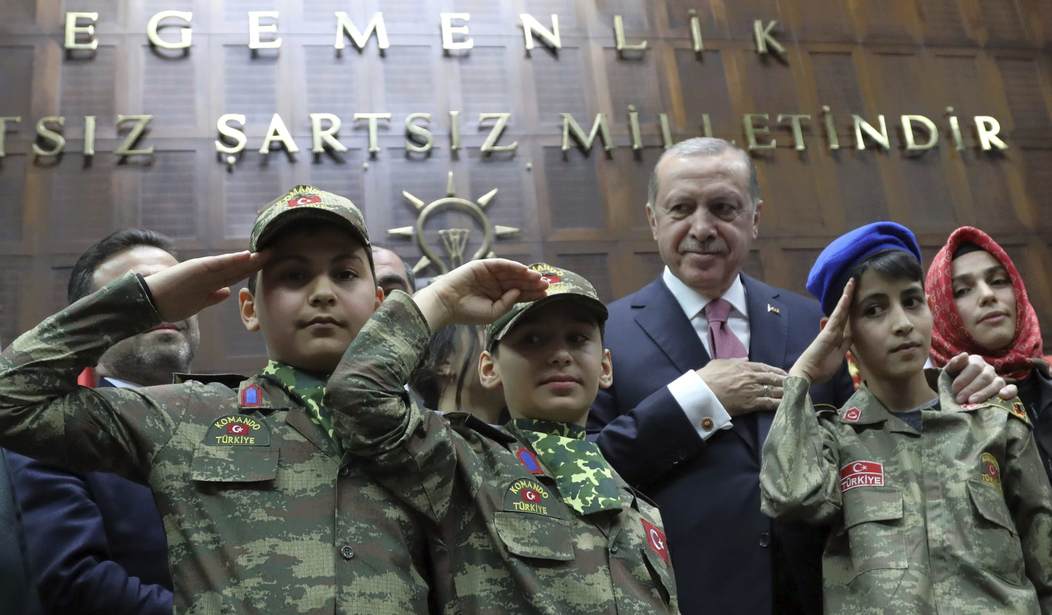Crossposted from Asia Times
————
Abandoned by Washington and under bombardment by the Turkish army, the beleaguered Kurdish forces in the northern Syrian town of Afrin asked for, and received, help from Russia. A spokesman for the Kurdish YPG militia announced on February 20 that the Russian-backed government of Bashar al-Assad would send reinforcements to Afrin to assist the Kurds. France24 reported that a convoy of pro-Assad forces entering Afrin came under Turkish artillery fire, and Turkey’s President Recep Erdogan claimed the government forces had to turn back.
The situation on the ground is unclear, but what is painfully clear is that Kurds have been abandoned by the United States less than a month after the Pentagon announced the formation of a 30,000-man “Border Security Force” in northern Syria composed mainly of Kurdish fighters who had pushed ISIS out of the area. Turkey responded to the American initiative by invading northern Syria and bombing the Kurds, reportedly killing several hundred civilians. In deference to Turkey, the United States did nothing, so the Kurds asked for help from Russia.
As Alfred Hackenberger wrote in the German daily Die Welt, on February 19: “Russia would belong to the winners in the case of a Syrian-Kurdish military alliance. It would expand Russia’s military control of the country markedly. And Turkey would have to stop its invasion of Afrin, because a confrontation with Syrian soldiers would bring it directly into conflict with Russia.”
The siege of Afrin, to be sure, seems a minor episode in the long and miserable course of Syria’s civil war, but it may turn out to demarcate the point that American influence in the region collapsed beyond repair. Trained by the U.S. and German armed forces, the Kurds represented the only effective force on the ground independent of the Russian-backed Assad regime following the defeat of Sunni militias backed by the U.S., Turkey, and Saudi Arabia. The Kurdish resurgence in Syria, though, drew a ferocious response from Turkey, which fears that Kurdish self-government spanning Iraq and Syria on its southeastern border would link up with its own rapidly growing Kurdish population. More than half of Turkey’s population under 30 will be ethnic Kurds by the mid-2040s.
For the U.S. administration, American assets in the region are like hotels on the Monopoly board, to be protected individually and piecemeal. No unified strategy ranks their relative importance or gauges whether they might be sacrificed for a larger goal.
After its painful experience in Iraq and Afghanistan, the U.S. won’t put boots on the ground beyond the few thousand special forces now deployed in Syria. The Kurds fought as a NATO auxiliary against ISIS and wanted nothing more than an American alliance. The Turks, meanwhile, are NATO members in name only and are hostile to key American interests. Among other things, Turkey is helping Russia to bypass Ukraine in delivering gas to southern Europe via the Turkstream pipeline. The Turks are bargaining hard with Russia, but ultimately will play ball.
Nonetheless, Washington is paralyzed by fear that Turkey might leave NATO if it stands behind the Kurds. “Nobody wants to be the guy who lost Turkey,” an administration official said.
The default view at the Pentagon is that Kurdish autonomy would create chaos in Iraq, threatening the country’s territorial autonomy. Iraq’s sectarian Shia government is now an ally of Iran, with Iranian-led Iraqi militias deployed in Syria. A little chaos in Iraq would strengthen America’s hand at the expense of Iran.
For Washington, the path of least resistance was to use the Kurds to fend off ISIS and then hang them out to dry. That left the Kurds with no other choice but to turn to the Assad government and its Russian backers. As a result, Russia is now the key ally both of the Assad government and the Kurdish militias that the U.S. envisioned as its boots on the ground in the region.
Israel, America’s only real ally in the region, realized the consequences immediately. Prime Minister Benjamin Netanyahu’s deputy minister for public diplomacy, Michael Oren, told Bloomberg News on February 12: “The American part of the equation is to back us up,” but the U.S. “has almost no leverage on the ground. America did not ante up in Syria. It’s not in the game.” Two days earlier, an Israeli F-16 was shot down by an anti-aircraft missile over Syria. Most reports claim that a Syrian anti-aircraft battery firing a Cold War era A-7 Russian missile downed the plane, but there are also unconfirmed reports that a Russian crew fired at it with a Russian S-200 missile. If that is true, Russia presumably wanted to let the Israelis know who was in charge of the Syrian skies.
Israel’s diplomacy with Russia appears to have borne results. On February 20, Russia Today reported the TASS news agency quoting Foreign Minister Sergey Lavrov as saying (on February 19): “Russia condemns Tehran’s remarks that Israel should be wiped off the map and also believes that solving any regional problems should not be viewed through the prism of a conflict with Iran.” According to the RT report: “He made the statement at the opening of the Valdai International Discussion Club’s conference ‘Russia in the Middle East: Playing on All Fields,’ adding that tensions between Israel and Iran are escalating and there are historical reasons for that.”
Russia does not want an Israeli-Iranian war, but it does want to be the regional power that keeps the two parties from fighting. Israel evidently is beholden to Moscow after the Afrin debacle, which left the United States with no ante in Syria, as Ambassador Oren put it. The projected Kurdish Border Protection Force was the last American piece on the Syrian chessboard, and Washington abandoned it. It is hard to see what sort of leverage the United States can acquire now.
“Americans play Monopoly, Russians chess,” was the title of an essay I published ten years ago in this space. For the U.S. administration, American assets in the region are like hotels on the Monopoly board, to be protected individually and piecemeal. No unified strategy ranks their relative importance or gauges whether they might be sacrificed for a larger goal. Russia views its assets as pieces on a chessboard whose only function is to contribute to the single goal of winning the game. They can be sacrificed ruthlessly when circumstances require it. Washington has no strategy — that is, no envisioned end state — for Turkey, Syria, or Iran. And if you don’t know where you’re going, any road will get you there.










Join the conversation as a VIP Member